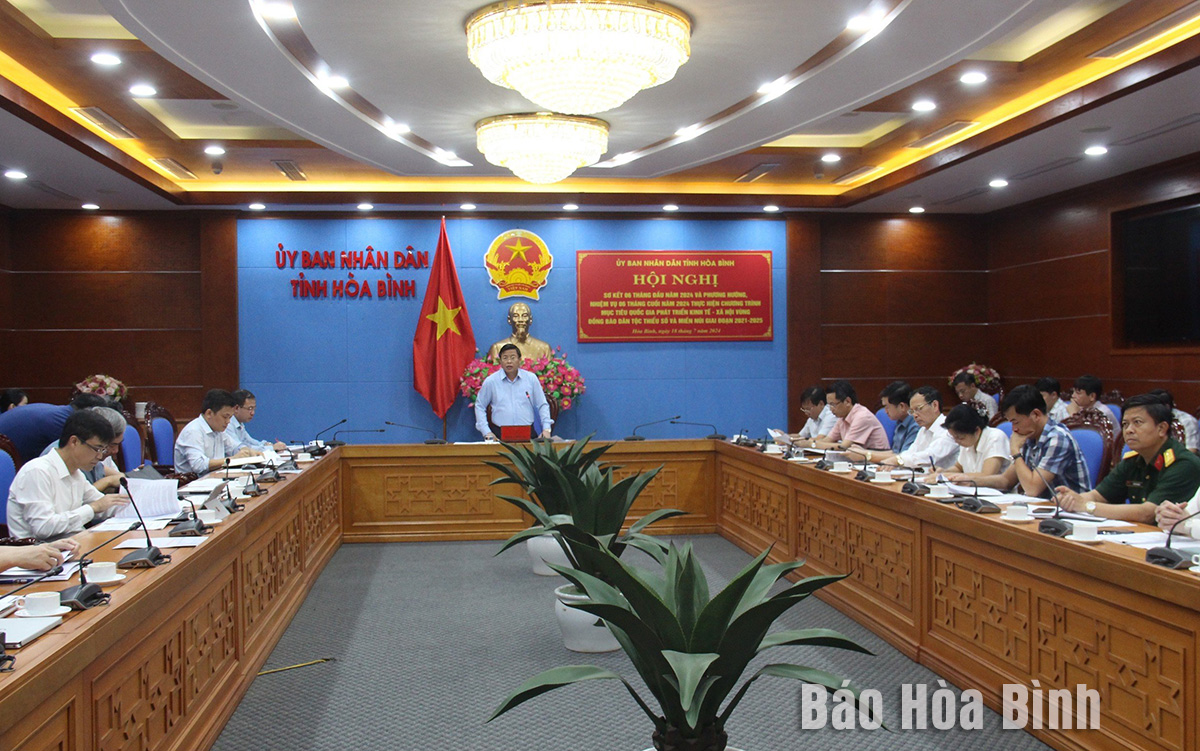
The Hoa Binh provincial People’s Committee held a meeting on July 18 to review the implementation of the national target programme on socio-economic development in ethnic minority and mountainous areas in the first half of 2024, and launch tasks and measures for H2. Vice Chairman of the provincial People’s Committee Dinh Cong Su presided over the event.
Vice Chairman of the provincial People’s Committee
Dinh Cong Su presides over the meeting.
Total funding for the programme implementation
in 2024, including the capital transferred from 2022 and 2023, stands at more
than 1.1 trillion VND (43.4 million USD). So far, over 27.6 billion VND or
8.64% of the sum transferred from 2022 and 2023, and 58.7 billion VND or 7.35%
of the capital assigned for 2024 has been disbursed.
At the meeting, officials from district-level
localities, departments, and sectors pointed out that the implementation of
some contents and the disbursement of the 2024 capital for the national target
programme are still sluggish, leading to the low disbursement rate.
They blamed the problem on the fact that the
documents guiding the programme implementation haven’t been reviewed, amended,
or supplemented in a timely manner. Preparations for the works and projects
using the state budget’s development investment capital are still made at a
snail’s pace. Some units haven’t shown reality-matching governance, policy response
remains slow, while there haven’t been breakthrough solutions.
Concluding the event, Vice Chairman Dinh Cong Su
demanded departments, sectors, and localities focus more on handling procedures
to speed up disbursement, review the works and projects lagging behind schedule
so as to build detailed disbursement plans, and specify disbursement targets to
ensure 100% of the assigned capital is allocated.
In addition, they need to enhance leaders’ sense
of responsibility towards the programme implementation; step up examination,
supervision, and assessment of the implementation of projects; and boost
monitoring to accelerate capital disbursement, he requested.
Mai Chau district has firmly established itself as a standout destination on Vietnam’s tourism map, attracting both domestic and international visitors with its breathtaking landscapes, rich ethnic culture, and warm hospitality. However, beyond its natural and cultural charm, a secure and well-managed tourism environment has added to Mai Chau’s appeal.
As Vietnam enters a new phase of economic and administrative reform in 2025, Hoa Binh province is stepping up its efforts to streamline governance, boost economic growth, and attract investment.
The Hoa Binh provincial People's Committee held its monthly meeting on March 26 to review the progress of key projects, assess budget revenue and public investment disbursement, provide feedback on draft documents for submission to the provincial Party Committee's Standing Board, and discuss other important matters related to the committee's governance activities.
Playing a key role in Hoa Binh province’s economic development, Luong Son district has been focusing on science and technology development, innovation, and digital transformation.
Identifying the application of online public services as a key step in administrative procedure reform and e-government building, Kim Boi district has proactively provided services and supported residents and businesses in accessing and utilising full-process online public services promptly and efficiently. The locality aims to lift the rate of end-to-end online public services to over 90%, with all officials and civil servants handling tasks in the digital environment.
Nguyen Anh Tuyet, hailing from a family steeped in the ancient art of herbal medicine, is transforming local medicinal herbs into high-value concentrated extracts, elevating their worth and healing potential.



